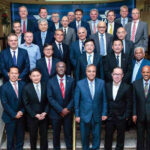CANCUN meeting is to promote safe, reliable and affordable air transport. We do that for the benefit of the people of the world and to foster commerce through collaboration and cooperation.
This year more than four billion passengers will rely on airlines for safe travel. Sixty-three million people depend on the global air transport system for employment. Aviation underpins $2.7 trillion of economic activity and delivers a third of global trade.
There is even greater value in what we do for people. IATA brings families and friends together across great distances. Helping students and future leaders gain international perspectives.
Aviation is globalisation at its very best. We help people to live better lives. And that includes many who will benefit from aviation without ever taking a flight. We can proudly say that aviation is the business of freedom.
The business of freedom depends on borders that are open to people and trade. We face headwinds today from those who would deny the benefits of globalisation.
In surveying the state of our industry today, I can report that these foundational elements of aviation—safety, sustainability and profit-ability—are solid.

Safety
Safety is our top priority. Because of that, flying is the safest form of long-distance travel by a wide measure. In 2016 there were 40.4 million flight sectors and 10 fatal accidents. While even a single accident is one too many, it is nevertheless a record of which we can be proud. At the same time, we constantly strive to do even better.
The IATA Operational Safety Audit—or IOSA—is a key tool in that effort. IOSA is compulsory for all our 275 members and the total number of airlines on the registry extends far beyond our membership. The value of the audit shows in the numbers. In 2016 the safety performance of airlines on the IOSA registry was nearly 50 per cent better than the record of those not on the registry.
LAST year, sub-Saharan Africa realised an important safety milestone. There were no jet hull losses in the region. Extending this great performance into the long-term will be a challenge. Airlines must continue the commitment to the IOSA discipline. The governments must continue to raise their levels of adherence to the global standards of the International Civil Aviation Organisation (ICAO).
In contrast to the progress in Africa, we have taken a step back in air accident investigations. Every accident represents an opportunity to learn more about making aviation even safer. But, of the 1,000 accidents investigated over the last decade, reports are available for only 300, and many of these are not exhaustive. There can be no excuse for a statistic like that. Governments must do better.
Sustainability
The year 2016 will go down in history as the year when governments made a critical decision to secure aviation’s license to grow sustainably. That was achieved in the landmark Carbon Offsetting and Reduction Scheme for International Aviation—or CORSIA—agreed at ICAO’s 39th Assembly.
CORSIA takes us a giant step forward in meeting our sustainability commitments, particularly carbon-neutral growth from 2020. Although it will be voluntary until 2026, already 70 states are on board. Together they represent at least 80% of anticipated growth. And we encourage more states to join.
Aviation stands at the forefront of industries combating climate change. We can be proud. But we must not be complacent. Our 2050 goal is to cut net emissions to half of what they were in 2005.
Let me also reassure you that the disappointing decision of the US to back out of the Paris Agreement is not a setback for CORSIA. They are completely separate agreements. The alternative to CORSIA is a patchwork of measures that would be ineffective, costly and unmanageable. Our membership remains united behind CORSIA and our climate change goals.

Financial Performance
Solid performance on safety is in aviation’s DNA. Leadership on climate change has been built over the last decade. And, over the last three years, we have made unprecedented progress on financial strength.
In 2017 we expect airlines to make $31.4 billion on $743 billion in revenues. That’s sound performance. And it’s good news for many. Passengers are benefiting from modern fleets, expanded networks and more product choice. Direct employment has grown to 2.8 million jobs. The investors are being appropriately rewarded with above-cost-of-capital returns of 8.8 per cent.
Strong demand is driving profitability. That includes air cargo, which has awakened from a six-year coma. Growth of 7.5 per cent is being powered by e-commerce and pharmaceutical shipments. E-air waybill penetration has finally topped 50 per cent.
The passenger business is expected to grow by 7.4 per cent this year. Load factors are over 80 per cent. Innovations sparked by the New Distribution Capability, or NDC, are making their way to market.
Challenges
This solid financial performance is epoch-making for an industry that has always struggled with profits. Our optimism, however, must be tempered with some caution.
MARGINS are being squeezed by rising costs for fuel and labour. And the $7.69 average profit per passenger still does not provide a thick buffer to economic shocks.
Moreover, profitability is not equally spread across the regions. Half the industry’s profits are being made in North America. Asia, Latin America and Europe are generating sustainable profits, but only just. And Africa and the Middle East are struggling.
And we also face some big challenges….
- Security threats are mounting
- An infrastructure crisis is looming, and
- Just when we need some relief from high taxes and onerous regulation, Smarter Regulation is coming under pressure.
Security
Today security dominates the headlines. The freedom that is at the core of aviation remains a target for terrorists. That was clear in UN Security Council Resolution 2309. It confirmed that States have more to do in fulfilling their responsibility to keep their citizens secure when travelling by plane.
That’s vital to airlines because keeping our passengers and crew safe and secure is our top priority. While that creates a natural partnership with governments on security, the relationship is showing cracks.
In March, the US and the UK banned large electronic devices in the cabin on flights from some Middle Eastern and African airports. There was no consultation with industry and little time to implement. The action caught everybody by surprise. And it was a big challenge for airlines to comply, and a huge inconvenience to our customers. It should not be that way.
We must trust that valid intelligence underpinned the UK and US decisions. But, the measures themselves test the confidence of the industry and the public—confidence that is critical for the success of any security regime.
The UK and the US have not aligned on airports that present a risk. Questions over the safety of placing so many lithium battery devices in the baggage hold have not been answered. And the other Five Eyes nations—Canada, Australia and New Zealand—are mitigating the threat without a ban.
It is a fact that airlines will never compromise on security. It is also a fact that taking electronic devices from passengers has real cost to them. In the current scope of the ban we estimate $180 million in lost productivity. And that could surge to $1.2 billion if the ban is expanded to flights from Europe to the US.
We need to get security right. There is a clear duty to make sure that the measures are logical, effective and efficient. That is not the case with the current ban. And it must change.

Security is ultimately a government responsibility. Governments have the resources and information. And they set the rules. But airlines also have a big stake in the matter. We have vital operational expertise. And we are asking for a robust dialogue with governments to put that expertise to good use. Quite frankly, it’s hard to understand the resistance.
FIRST, we must find alternatives to the ban. In the short-term, these include more intense screening at the gate and skills training. In the medium-term more advanced and faster explosive detection technology is the solution to evolving bomb threats. But painfully slow certification processes must be accelerated so that we can actually use it.
To be clear, my message to governments on security is one of partnership:
- Work with us to implement alternatives to the current ban
- Work with us to accelerate technology innovation,
- Work with us to mitigate future threats, and
- Work better together
This last message—work better together—could be addressed through ICAO’s efforts to establish a Global Aviation Security Plan (GASeP). It must lay the groundwork for effective information-sharing among states and with the industry—the key to addressing current and future threats.
Crisis of the Infrastructure
Less in the public eye, but equally important to the future of the business of freedom, is infrastructure. An infrastructure crisis is looming.
Our infrastructure can barely cope with demand today. And, development plans are not ambitious enough to accommodate the 7.2 billion passengers we expect in 20 years’ time.
Europe is the extreme example. Euro control predicts that the continent’s airports will only be able to accommodate 88 per cent of the expected demand in 2035. Unless there is major change, we estimate that the cost of infrastructure deficiencies to Europe’s prosperity will reach EUR 245 billion in the same year.
I am not just picking on Europe. There are airport bottlenecks from Bangkok and Sydney to New York, Mexico City and São Paulo. Air traffic congestion is at unbearable levels in China, the Gulf, Europe and the US.
The first tool in addressing these deficiencies is IATA’s Worldwide Slot Guidelines (WSG). We are working with stakeholders to modernise them and ensure that they are fully implemented. Their effectiveness in managing scarce resources fairly and efficiently is the key. But they are not a substitute for building infrastructure where demand exists.
Aviation’s economic benefits can only be unlocked if governments provide sufficient capacity, with service quality aligned to user expectations and at an affordable cost.

Amazing results are produced when governments link aviation’s development to national economic strategy. Singapore, South Korea, the UAE, Qatar and Panama are among the rare examples. Encouragingly, Germany is making efforts to join the club with its recently announced Aviation Concept. It needs to move from concept to action, and I hope that other states will see the benefits and follow.
IT might also help move the Single European Sky—or SES—forward. The first mention of SES at an IATA AGM was at our last meeting in Mexico—in 1994! And there’s been little progress since. We have not given up. Our latest effort on SES asks governments to achieve SES benefits with national airspace strategies leading, eventually, to Europe-wide modernisation.
In the US, the politicisation of Federal Aviation Administration funding has slowed the NextGen initiative to a crawl. That’s why we are advocating the corporatisation of the air traffic organisation using the successful governance model of Nav Canada.
Many cash-strapped governments see privatisation as the solution for infrastructure funding. They should be cautious. Privatisation has failed to deliver promised benefits in many countries—India, Brazil, France, and Australia to name just a few. The concessionaire makes money. The government gets its cut. The airlines pay the bill—usually a big one. And passengers and the local economy suffer the results of higher costs.
When governments privatise critical infrastructure, economic regulation is essential. To date I cannot name a single success story. Finding the solution is an important piece of work that needs government and industry collaboration. It’s the only way to balance the investor’s need for profit with the community’s need for cost efficient connectivity.
Speaking of the need for balanced solutions, I refer to Heathrow. We’ve waited decades for a third runway. The UK Government has finally committed to build it. But the GBP 17 billion price tag is an outrageously expensive bill that we are not prepared to pay.

Capacity, quality and affordability—it is a common-sense mantra that we must insist on in our dialogue with governments at every possible opportunity.
Smarter Regulation
The last challenge is building Smarter Regulation in an age focused on immediate gratification.
Over 100,000 flights will operate without incident today. On occasion, however, things go wrong. And, as we have seen recently, the potency of social media to hold individual companies and entire industries instantly accountable is formidable.
Regulators and politicians can feel confident that the discipline of competitive market forces has been given a boost. And regulators, themselves, face pressure to respond to social media frenzies with immediate solutions. Hastily-built regulations bring un-intended consequences. That’s why Smarter Regulation principles are absolutely critical.
Smarter Regulation can address issues in a timely manner. But it is more considered than immediate. An open dialogue with governments focused on solving real problems is the starting point. And that discussion should be guided by global standards and informed by a rigorous cost-benefit analysis.
At its best, Smarter Regulation is proactive. That’s how we achieved CORSIA—a game-changing global agreement on climate change.
We are experiencing the opposite here in Mexico. Passenger rights regulations are being developed in contravention of global standards—forbidding airlines to sell tickets without baggage or with cancellation restrictions. And all delays of two hours or more would need to be compensated—regardless of the cause.
IF signed into law, we can expect higher ticket prices and fewer choices. This regulation will rebound to the detriment of the very passengers that the regulations seek to protect.
A Smarter Regulation approach can also be applied to taxation. When governments do their homework, they see the benefits of lowering taxes on air travel. That’s exactly what Austria is doing—cutting its departure tax in half. And it’s what Sweden and Australia should consider, instead of planning economically destructive tax increases.
What leverage do we have to promote Smarter Regulations? One element is the curiosity and affinity that many people have for aviation. People want and need to fly safely, efficiently and affordably. That should move governments to enable the business of freedom with Smarter Regulation and reasonable taxes.
The Business of Freedom
Today, 11 million people will trust our companies to transport them safely. And our aircraft will be full with 150,000 tonnes of cargo—the input and output of the global economy. This is our industry at work—an engine of commerce.
As an association we stand resolute for borders that are open to people and to trade. That is essential for our members—the world’s airlines—to deliver the magic that is created by commercial flight. Nothing should stand in our way. We are the business of freedom!



























































